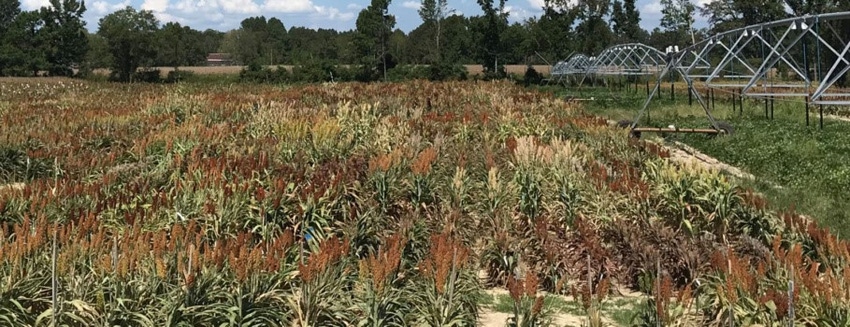Company's first project is to develop regionally adapted grain sorghum.
November 19, 2018

A concept born out of research from Clemson University’s Advanced Plant Technology (APT) Program is taking shape as a company that seeks to revolutionize regional agriculture by building a feed grain pipeline through the southeastern U.S.
The company, Carolina Seed Systems, is working to address a lack of feed grain hybrid crop development and a regional feed shortage by creating a grower-focused company to take advantage of South Carolina’s unique environment to maximize crop productivity, according to an announcement from Clemson University.
“Most of the seed companies are out in the Midwest, the Heartland,” said Zachary Brenton, APT alumnus and founder and chief executive officer of Carolina Seed Systems. “Sorghum companies are mainly in west Texas, and that’s just not an appropriate environment to breed sorghum for the Southeast. So, what we’re trying to do is leverage our unique environment so that we can ultimately increase crop yield and grower profitability, which, in turn, gives us the ability to also affect profit on the producer side of the animal industry in South Carolina.”
Grain sorghum is a cereal grain that is often used as a substitute for corn and feeding rations in the animal industry. Because it is highly tolerant to drought and also efficient in its nutrient use, grain sorghum is a highly sustainable crop option for farmers that lowers their seed cost and increases their profitability.
As graduate students in Clemson’s APT Program, Brenton and Richard Boyles evaluated grain sorghum characteristics and began working to exploit natural variations in the plant�’s genetic material to determine what genes are responsible for adapting it to the climate in South Carolina and the southeastern U.S.
After completing their doctoral work, Boyles took a job as a research scientist at Clemson’s Pee Dee Research & Education Center in Florence, S.C., while Brenton left to pursue Carolina Seed Systems, which has licensed the intellectual property from Clemson through the Clemson University Research Foundation (CURF).
Boyles said the concept for the company is “a vertically integrated supply chain,” meaning that both the university and Carolina Seed Systems would be integrated into the entire process from start to finish to best meet the needs of both ends of the supply chain — from grower to end user.
“Basically, from the start, when the seed goes into the ground, to that end product, whether it goes into an animal or whether it goes into human food or any other products, we want to be involved in some capacity,” he said. “That allows us to stay in tune with what each sector of the supply chain is looking for, what their challenges are and then also how can we best fit into it and get better science and technology from the university out to companies like Carolina Seed Systems so that they can develop better products, ultimately, for the growers.”
Because of the globalization and consolidation of the seed industry, South Carolina and the southeastern U.S. are underserved as a production region of critical importance to both row-crop and animal industries in the 21st century, Clemson said.
APT is a key part of an overall effort at the university to optimize plants for production in South Carolina and the Southeast for all agricultural stakeholders — from large-scale producers to small-scale landowners who work with heirloom varieties for restaurants, brewers and more.
Stephen Kresovich, director of the Clemson Institute of Translational Genetics and the APT Program, said, “Though grain sorghum for the regional animal industries is the initial product of Carolina Seed Systems, the real value to South Carolina agriculture is that it will serve as a flexible, 21st-century agricultural technology company specifically serving the priorities of crop agriculture.”
Tim Lust, CEO of the National Sorghum Producers and United Sorghum checkoff, said the success of this program is delivering regionally adapted grain sorghum hybrids to farmers.
“Typically, the sorghum seed industry focuses breeding efforts in areas where more sorghum is produced, in states such as Kansas and Texas, leaving potential growth areas such as the mid-Atlantic without diverse hybrid choices. Carolina Seed Systems has an opportunity to match local grain demand with tailored hybrids, which will increase grain sorghum productivity and, most importantly, increase on-farm profitability for sorghum producers,” Lust said.
While increasing crop productivity and limiting the environmental impacts of agriculture, the ultimate goal of the company is to increase the number of feed grains available to end users by working with growers to create better product lines.
“The Carolinas import about 300 million bu. of grain sorghum per year,” Brenton said. “Rather than having that come through the ports of Wilmington (N.C.) or Charleston (S.C.) or railed in from the Midwest, we’re trying to make our acreage more productive so that our growers can take advantage of that revenue. It’s a local agricultural play to help growers achieve their maximum profitability, and that’s addressing the growing challenges we have facing world agriculture.”
Carolina Seed Systems saw grain sorghum as the first opportunity and used the Clemson APT Program to explore it, but the company has plans to diversify its product line and provide other opportunities for growers in the future.
“The vision of Carolina Seed Systems and even here at Clemson University, we’re not just working on sorghum but also any crop that’s a good fit for the state, for the region and elsewhere,” Boyles said.
You May Also Like

.png?width=300&auto=webp&quality=80&disable=upscale)

